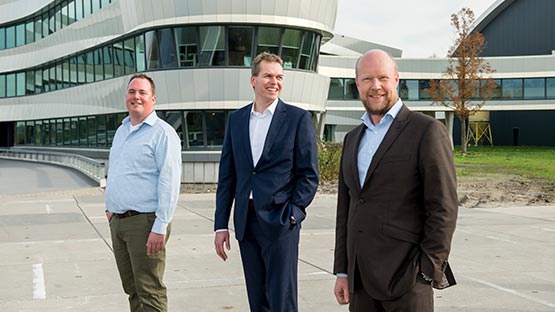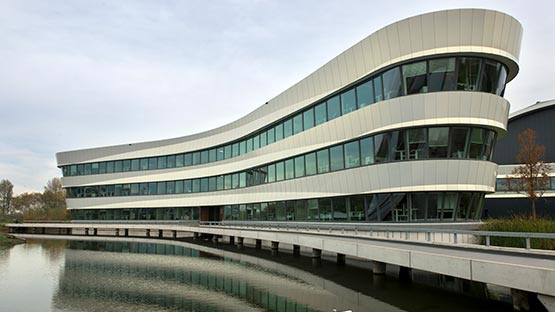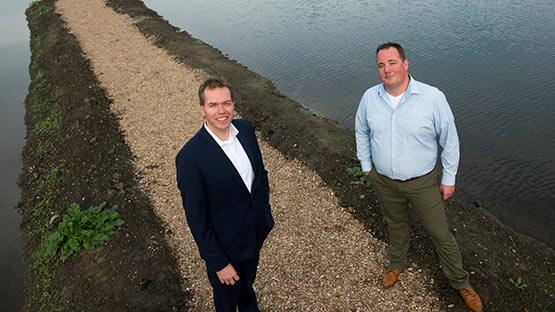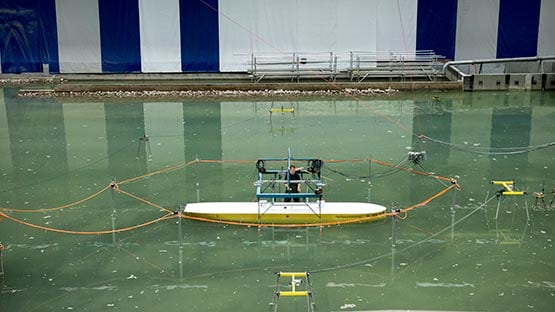Artificial intelligence can help organisations to recognise patterns at an early stage and also – by analysing data at lightning speed – to predict the outcome of a project. Working with PwC, Deltares – the independent applied knowledge institute for issues in the field of water and the subsoil – applied machine learning algorithms to ten years of project records.
“Within just five weeks, this pilot project has given us a great deal of insight into how we control our financial projects. We are increasingly moving from present control towards future control", says Twann Verhoeven of Deltares.

From left to right: Niels de Vries, Twann Verhoeven (both Deltares) and Mark Tesselaar (PwC).

Predictive project analysis
Deltares is no stranger to the use of artificial intelligence as a solution to water and soil issues. It’s in fact one of the five focus areas in the 2018–2021 strategic policy of this 800-employee company with offices in Delft and Utrecht. But Deltares hadn’t previously linked machine learning to its own financial project data. PwC then invited the company to participate as a launching customer in a co-creation project to develop a Predictive Project Analysis tool.
PwC’s director Mark Tesselaar explains: “Companies often set up project management offices so as to get a grip on projects and to keep the management informed about their progress. In practice, though, the reports are often incomplete, inaccurate, non-factual, not on time, or too complex to understand. Moreover, they often describe the current project status instead of predicting future results. With artificial intelligence we can change this and can help organisations to recognise patterns at an early stage and also – by analysing data at lightning speed – to predict the outcome of the project.”
Algorithms versus gut feeling
Nowadays, businesses can quickly access large amounts of computing power at low cost via the cloud. This facilitates the export, processing, and analysis of digitally recorded project data such as e-mail traffic, time records, budgets, decisions, and reports. You can apply algorithms that are available online to varied, objective, and immediately available data. Each new project improves the algorithm, and the knowledge that results from it is then widely shared within the organisation. This tendency led PwC to develop a Predictive Project Analysis tool.
Once the basic tool had been created, PwC approached a number of customers – including Deltares – to ask whether they wanted to make projects with uncertain outcomes more predictable on the basis of data. “Project managers often do know what the determining factors are,” says Mr Tesselaar, but that’s mostly based on their gut feeling. And it’s very often influenced by what they happen to feel like at the time, or whether they had a row with their partner the night before... It’s then great to be able to support the project leader’s work with a lot more real data. With a tool that makes clear after just a few mouse clicks that you won’t just get a warning when the financial figures are going in the wrong direction but will tell you ‘if you don’t change this, things will soon go wrong financially’.”


Guidance for financial project management
Deltares and PwC examined ten years of project management, amounting to 14,385 projects. Of these, 5500 turned out to be useful for analysis. “That was immediately our first valuable lesson,” says Twann Verhoeven (finance and control manager at Deltares) and his colleague Niels de Vries (responsible for analytics and information management), looking back at the collaboration.
“The more usable historical output data you have available, the better the forecast. The quality and completeness of the data are important. This pilot project has given us a great deal of insight into the way we manage our financial projects. We now know even better how to design future projects – both administratively and in terms of content – so that they can be included in the analysis. You need to take your time to get the data in order, standardise the export and preprocessing process, and export the data as ‘raw as possible. You have to ensure standardised work procedures and record what you’ve done and why, so that everyone who works with the data knows why any changes have been made. What we ultimately want is to be able to predict more and more accurately whether a project will be successful or not, while it’s still running.”
Budget overrun or project success?
Before organisations start using Predictive Project Analysis effectively, it’s important to determine what they want to predict; is it budget overrun or project success? “Originally,” says Niels de Vries, “we wanted to predict the expected budget overrun, but the functions we’d selected were insufficient. We then switched to predicting the expected over- or underspending at each stage of the project. That ultimately resulted in a better and more user-friendly dashboard with various reporting levels. Each stakeholder can now gain an understanding at their own level – strategic, tactical, or operational – of the success of their project or of the merging of projects.”
De Vries: "At Deltares, we were very much engaged in ‘past control’. We generated the figures and a week or a week and a half later the monthly figures came out. The situation now is one of ‘present control’, with immediate information. I expect this information to increasingly contribute to ‘future control’, i.e. to be immediately incorporated into the project management system utilised by our project managers, so that they can make adjustments in advance. But it will remain a decision support system, so it won’t take over entire teams.”


"While we learned from PwC as regards finance, PwC learned from us as regards machine learning and artificial intelligence. That was also an important starting point for this project: learning from one another.”
Knowledge partnership: learning from one another
Both Deltares and PwC praise the close cooperation that the combined team displayed during the one-month pilot period. “This wasn’t just a project with a standard start and finish and a report to be delivered,” says Twann Verhoeven. No, it really was a case of co-creation, with a lot of freedom and scope, to create something great together. We made clear in advance that ‘failure can also be a success’. That too can be an outcome.”
Mark Tesselaar agrees: “For us too, this is a whole new development as regards projects. It’s not about implementation or content but about the administrative project documentation and what you can learn from that if you apply artificial intelligence to it. It was real fun to have Deltares data experts working alongside our own. It’s no longer a question of one party perhaps lagging behind in knowledge and the other having a knowledge lead. What it’s all about is bringing those worlds together and really working together.”
"When you look at artificial intelligence and machine learning,” says Twann Verhoeven, “then we at Deltares have a lot of knowledge and are working hard on it. Except for the fact that that has to do with water and the soil – something very different to finance. That’s precisely why we found the collaboration with PwC so interesting. The PwC database comprises 110,000 projects, which enables us to achieve a much larger and faster learning curve. While we learned from PwC as regards finance, PwC learned from us as regards machine learning and artificial intelligence. That was also an important starting point for this project: learning from one another.”
Direction based on financial and business data
Both Deltares and PwC are now continuing to develop the tool independently. They’ll get together again next year to learn from one another’s experience. “The ultimate objective remains for direction to be based on both financial and also business data,” says Niels de Vries. ”In the first half of 2019 we want to see how we can also use this approach in our requests for proposals. We want to find out how we can determine – on the basis of financial and substantive project data – whether it’s logical to enter into a specific quotation process.”

Contact

Mark Tesselaar
Senior director Risk Assurance T&L, PwC Netherlands
Tel: +31 (0)65 313 20 65















